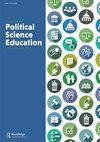Electoral Candidate Debates for Policy Learning in Large First-Year Classes
IF 0.6
Q3 POLITICAL SCIENCE
引用次数: 1
Abstract
Abstract The benefits of experiential learning are well-documented, but large course enrollment can be seen as a barrier to providing meaningful experiential learning experiences. Political science literature on experiential learning in large undergraduate classes has prioritized simulations of political processes over direct student engagement in actual political processes. This multiple case study analyzes two in-class electoral candidate debates, one municipal and one federal, organized in a 300-student introductory social welfare course. Detailing the tensions inherent to organizing for maximum student engagement, and drawing on qualitative data from 73 student reflections, we found that in-class electoral candidate debates are feasible and effective as an experiential civic education activity. Though preparation work was complex and substantial, in-class candidate debates resulted in a rich learning foundation for the whole course. Key components for effective learning included student generated topics and questions and a wide range of candidates. Debriefing was also essential given the varied levels of prior knowledge inevitable in large classes. This paper extends the literature on teaching in the large policy classroom to a promising new experiential learning activity. It provides useful guidance for others who wish to harness the benefits of experiential civic education in large classes.大一学生政策学习的选举候选人辩论
摘要体验式学习的好处是有据可查的,但大量的课程招生可能被视为提供有意义的体验式学习体验的障碍。关于大型本科生课堂体验式学习的政治学文献将模拟政治过程置于学生直接参与实际政治过程之上。这项多案例研究分析了在一门300名学生的社会福利入门课程中组织的两次选举候选人课堂辩论,一次是市政辩论,另一次是联邦辩论。详细描述了组织最大限度地提高学生参与度所固有的紧张关系,并利用73名学生反思的定性数据,我们发现,课堂选举候选人辩论作为一种体验式的公民教育活动是可行和有效的。尽管准备工作既复杂又充实,但课堂上的候选人辩论为整个课程奠定了丰富的学习基础。有效学习的关键组成部分包括学生提出的主题和问题以及广泛的候选人。鉴于在大型课堂上不可避免地会有不同程度的先验知识,汇报也是必不可少的。本文将有关大型政策课堂教学的文献扩展到一种很有前途的新型体验式学习活动。它为其他希望在大班中利用体验式公民教育的好处的人提供了有用的指导。
本文章由计算机程序翻译,如有差异,请以英文原文为准。
求助全文
约1分钟内获得全文
求助全文
来源期刊

Journal of Political Science Education
POLITICAL SCIENCE-
CiteScore
1.80
自引率
36.40%
发文量
69
期刊介绍:
The Journal of Political Science Education is an intellectually rigorous, path-breaking, agenda-setting journal that publishes the highest quality scholarship on teaching and pedagogical issues in political science. The journal aims to represent the full range of questions, issues and approaches regarding political science education, including teaching-related issues, methods and techniques, learning/teaching activities and devices, educational assessment in political science, graduate education, and curriculum development. In particular, the journal''s Editors welcome studies that reflect the scholarship of teaching and learning, or works that would be informative and/or of practical use to the readers of the Journal of Political Science Education , and address topics in an empirical way, making use of the techniques that political scientists use in their own substantive research.
 求助内容:
求助内容: 应助结果提醒方式:
应助结果提醒方式:


